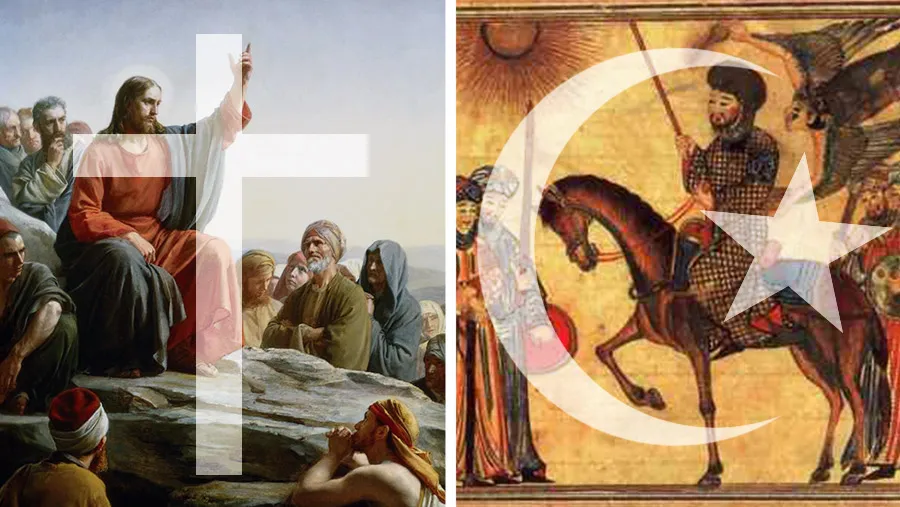Table of Contents
In the first part of this post, I looked at how French president Immanuel Macron responded to near-fortnightly Islamic terror attacks in his country by proposing an ambitious reform program. While Macron is to be lauded for finally admitting that France — and the rest of the West — really does have an “Islam problem”, his proposed reforms are doomed to fail, by ignoring some fundamental facts about Islam.
Macron simply ignores the fact that there are fundamental differences between Islam and Christianity. Differences which no amount of “They are us” wishful thinking can overcome. These have tremendous implications for a secular society attempting to reach accommodation with growing Islamic minorities in their midst.
In Macron’s Western and indeed post-Christian understanding of secularity, religion is a personal, individual affair, and to follow a religion is an expression of individual freedom. By this reckoning, religion belongs in the home and in the church or mosque, not in public life. Thus Macron revealingly said in his October 2 speech, “If spirituality is a matter for the individual, secularity [laïcité] concerns us all.” Not so in Islam. In Islam spirituality is not merely a matter for the individual. Rather, religion is integral to politics: gaining power for Islam is the responsibility of all Muslims, and establishing the religion of Islam is the whole reason for an Islamic state’s existence.
This is the single most far-reaching difference between Islam and the Christian religion which has shaped Western democracy. There is simply nothing like the Biblical injunction to Render to Caesar the things that are Caesar’s. Even secular Western elites, who are not just a-religious, but often anti-religious, take the idea of separation of church and state as a given.
As Bernard Lewis repeatedly pointed out, classical Arabic did not even have the language to make the distinction between church and state, sacred and profane, spiritual and temporal, and ecclesiastical and secular. Such terms entered Arabic via the writings of Arabic-speaking Christians.
Macron, like so many Western elites, fails to take seriously what is hard-wired in Islam: to seek power in order for Islam to prevail. “It is he [Allah] who sent his Messenger with guidance and the religion of truth [Islam] to make it prevail over every religion” (Sura 9:33). Contrary to the things that are Caesar’s, the Koran proclaims, “To Allah belongs whatever is in the heavens and whatever is on the earth” (Sura 3:109).
The will to separate is a part of orthodox Islamic spirituality, and because Islam does not separate the temporal from the spiritual, the separation Muslims seek is not merely spiritual, but political and cultural.
In classical Islamic jurisprudence it was forbidden for Muslims to live outside of an Islamic state for more than a few days at a time. This prohibition is particularly strong in the Maliki school of jurisprudence practised in the north-west of Africa, which is the dominant form of Islamic law practised in France.
Islamic thinkers have in fact devoted a great deal of energy to the question of Muslims becoming naturalised citizens of non-Muslim states. In 1985, the International Fiqh (or jurisprudence) Academy (IFA), based in Jeddah, sought the opinions of eminent Muslim scholars. Pakistan’s Judge Mohammad Taqi Uthmani, acclaimed as one of the most influential Muslims in the world, wrote that:
[N]aturalisation is absolutely forbidden if the nationalised Muslim’s intention is to advance their new nation, be proud of it, or resemble its people in practical ways (such as in clothing or cultural conventions). This conclusion was so obvious, Uthmani said, that “there is no need to give evidence” for it. Yet this is exactly what Macron is asking of French Muslims: that they should be transformed into loyal and proud citizens, adopting and conforming themselves to the values of the Republic.
Other leading scholars agreed, citing the Koran: You who believe! Do not take the Jews and the Christians as friends [allies or guardians] (Sura 5:51).
Yet, quite obviously many Muslims are friends with non-Muslims (especially if progressive’s endless bragging about “some of my best friends are Muslim” is to be believed). This cannot be laid to just “cultural Muslims”, because, anecdotally, I’ve known pious Muslims who I wouldn’t call “friends”, but who are unfailingly friendly as acquaintances.
But that is to commit the error of mistaking what many Muslims are like, with what Islam teaches. After all, Catholic Italy has long had high rates of contraception use — which doesn’t mean that the Catholic Church doesn’t proscribe it. Christopher Hitchens made the same point to Waleed Aly, who tried to dance around the fact of Islamic hostility to homosexuality: It’s not what Muslims think, it’s what Islam teaches we asked you about.
President of the Australian Council of Imams, Sheikh Shady Alsuleiman, argues that:
Muhammad’s command not to live among the kuffar was a policy for Medina, when Muslims were strong, not for Mecca, when Muslims were weak. Today, he said, Muslims do not hold power, and there is not even any genuinely Islamic country for them to migrate to: the implication is that Muslims must accustom themselves to living among infidels and under their authority. He also observed that if Muslims communicate hatred to non-Muslims, no one would convert to Islam. Sheikh Shady concluded that, as long as Muslims are “in a state of weakness … we can’t implement the rulings of strength”. The clear implication is that until they have power, Muslims must accustom themselves to accepting life under non-Muslim dominance, and the open manifestation of rejection of the infidel awaits the hoped-for but not yet realised political ascendancy of Islam.
Quadrant Online
Which begs the further question of: What happens when Islam is politically dominant? That answer can be seen in repeated examples, such as the Islamic revival in Algeria before WWII. At first, leaders like Abdul-Hamid ibn Badis were adamant in assuring the French authorities that “We are not intending… to mix religion and politics”. But, as was praised by an American Muslim historian in 2002, “that was just to conceal the real activities that were happening”: a movement which culminated in the bloody Algerian war of independence. The less than 3% non-Muslim Algerians today are under increasing official pressure, including church closures.
Macron attempts to enlist classical Muslim scholars Averroes (Ibn Rushd) and Ibn Khaldun. But both would be considered “Islamists” today. Ibn Khaldun explicitly criticised the separation of church and state in Christianity, and argued that “in the Muslim community, the holy war is a religious duty, because of the universalism of the [Muslim] mission and the [obligation to] convert everybody to Islam either by persuasion or by force”.
So, in many ways Macron is right. Many in the West do need to understand better Islamic theology and its great teachers.
The problem is that they may not like what they find.







